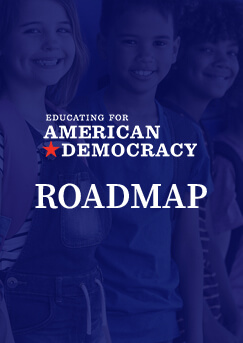GENERAL INQUIRIES:
Comments or questions? Send us a message and we’ll make sure it gets to the right person.
FOR MEDIA INQUIRIES:
Email: jacob@oneallen.com

GENERAL INQUIRIES:
Comments or questions? Send us a message and we’ll make sure it gets to the right person.
FOR MEDIA INQUIRIES:
Email: jacob@oneallen.com

Get the Roadmap and Report to unlock the work of over 300 leading scholars, educators, practitioners, and others who spent thousands of hours preparing this robust framework and guiding principles. The time is now to prioritize history and civics.
Your contact information will not be shared, and only used to send additional updates and materials from Educating for American Democracy, from which you can unsubscribe.
This theme explores the idea of “the people” as a political concept–not just a group of people who share a landscape but a group of people who share political ideals and institutions.
This theme explores how social arrangements and conflicts have combined with political institutions to shape American life from the earliest colonial period to the present, investigates which moments of change have most defined the country, and builds understanding of how American political institutions and society changes.
This theme explores the contemporary terrain of civic participation and civic agency, investigating how historical narratives shape current political arguments, how values and information shape policy arguments, and how the American people continues to renew or remake itself in pursuit of fulfillment of the promise of constitutional democracy.
This theme explores the relationship between self-government and civic participation, drawing on the discipline of history to explore how citizens’ active engagement has mattered for American society and on the discipline of civics to explore the principles, values, habits, and skills that support productive engagement in a healthy, resilient constitutional democracy. This theme focuses attention on the overarching goal of engaging young people as civic participants and preparing them to assume that role successfully.
This theme begins from the recognition that American civic experience is tied to a particular place, and explores the history of how the United States has come to develop the physical and geographical shape it has, the complex experiences of harm and benefit which that history has delivered to different portions of the American population, and the civics questions of how political communities form in the first place, become connected to specific places, and develop membership rules. The theme also takes up the question of our contemporary responsibility to the natural world.
This theme explores the institutional history of the United States as well as the theoretical underpinnings of constitutional design.
This theme explores the place of the U.S. and the American people in a global context, investigating key historical events in international affairs,and building understanding of the principles, values, and laws at stake in debates about America’s role in the world.
The Seven Themes provide the organizational framework for the Roadmap. They map out the knowledge, skills, and dispositions that students should be able to explore in order to be engaged in informed, authentic, and healthy civic participation. Importantly, they are neither standards nor curriculum, but rather a starting point for the design of standards, curricula, resources, and lessons.
Driving questions provide a glimpse into the types of inquiries that teachers can write and develop in support of in-depth civic learning. Think of them as a starting point in your curricular design.
Learn more about inquiry-based learning in the Pedagogy Companion.
Sample guiding questions are designed to foster classroom discussion, and can be starting points for one or multiple lessons. It is important to note that the sample guiding questions provided in the Roadmap are NOT an exhaustive list of questions. There are many other great topics and questions that can be explored.
Learn more about inquiry-based learning in the Pedagogy Companion.
The Seven Themes provide the organizational framework for the Roadmap. They map out the knowledge, skills, and dispositions that students should be able to explore in order to be engaged in informed, authentic, and healthy civic participation. Importantly, they are neither standards nor curriculum, but rather a starting point for the design of standards, curricula, resources, and lessons.
America’s constitutional politics are rife with tensions and complexities. Our Design Challenges, which are arranged alongside our Themes, identify and clarify the most significant tensions that writers of standards, curricula, texts, lessons, and assessments will grapple with. In proactively recognizing and acknowledging these challenges, educators will help students better understand the complicated issues that arise in American history and civics.
Each theme is supported by key concepts that map out the knowledge, skills, and dispositions students should be able to explore in order to be engaged in informed, authentic, and healthy civic participation. They are vertically spiraled and developed to apply to K—5 and 6—12. Importantly, they are not standards, but rather offer a vision for the integration of history and civics throughout grades K—12.
EAD teacher draws on six pedagogical principles that are connected sequentially.
Six Core Pedagogical Principles are part of our Pedagogy Companion. The Pedagogical Principles are designed to focus educators’ effort on techniques that best support the learning and development of student agency required of history and civic education.
EAD teachers commit to learn about and teach full and multifaceted historical and civic narratives. They appreciate student diversity and assume all students’ capacity for learning complex and rigorous content. EAD teachers focus on inclusion and equity in both content and approach as they spiral instruction across grade bands, increasing complexity and depth about relevant history and contemporary issues.
EAD teachers have a growth mindset for themselves and their students, meaning that they engage in continuous self-reflection and cultivate self-knowledge. They learn and adopt content as well as practices that help all learners of diverse backgrounds reach excellence. EAD teachers need continuous and rigorous professional development (PD) and access to professional learning communities (PLCs) that offer peer support and mentoring opportunities, especially about content, pedagogical approaches, and instruction-embedded assessments.
EAD teachers cultivate and sustain a learning environment by partnering with administrators, students, and families to conduct deep inquiry about the multifaceted stories of American constitutional democracy. They set expectations that all students know they belong and contribute to the classroom community. Students establish ownership and responsibility for their learning through mutual respect and an inclusive culture that enables students to engage courageously in rigorous discussion.
EAD teachers not only use the EAD Roadmap inquiry prompts as entry points to teaching full and complex content, but also cultivate students’ capacity to develop their own deep and critical inquiries about American history, civic life, and their identities and communities. They embrace these rigorous inquiries as a way to advance students’ historical and civic knowledge, and to connect that knowledge to themselves and their communities. They also help students cultivate empathy across differences and inquisitiveness to ask difficult questions, which are core to historical understanding and constructive civic participation.
EAD teachers use their content knowledge and classroom leadership to model our constitutional principle of “We the People” through democratic practices and promoting civic responsibilities, civil rights, and civic friendship in their classrooms. EAD teachers deepen students’ grasp of content and concepts by creating student opportunities to engage with real-world events and problem-solving about issues in their communities by taking informed action to create a more perfect union.
EAD teachers use assessments as a tool to ensure all students understand civics content and concepts and apply civics skills and agency. Students have the opportunity to reflect on their learning and give feedback to their teachers in higher-order thinking exercises that enhance as well as measure learning. EAD teachers analyze and utilize feedback and assessment for self-reflection and improving instruction.
EAD teachers have a growth mindset for themselves and their students, meaning that they engage in continuous self-reflection and cultivate self-knowledge. They learn and adopt content as well as practices that help all learners of diverse backgrounds reach excellence. EAD teachers need continuous and rigorous professional development (PD) and access to professional learning communities (PLCs) that offer peer support and mentoring opportunities, especially about content, pedagogical approaches, and instruction-embedded assessments.
EAD teachers cultivate and sustain a learning environment by partnering with administrators, students, and families to conduct deep inquiry about the multifaceted stories of American constitutional democracy. They set expectations that all students know they belong and contribute to the classroom community. Students establish ownership and responsibility for their learning through mutual respect and an inclusive culture that enables students to engage courageously in rigorous discussion.
EAD teachers not only use the EAD Roadmap inquiry prompts as entry points to teaching full and complex content, but also cultivate students’ capacity to develop their own deep and critical inquiries about American history, civic life, and their identities and communities. They embrace these rigorous inquiries as a way to advance students’ historical and civic knowledge, and to connect that knowledge to themselves and their communities. They also help students cultivate empathy across differences and inquisitiveness to ask difficult questions, which are core to historical understanding and constructive civic participation.
EAD teachers use their content knowledge and classroom leadership to model our constitutional principle of “We the People” through democratic practices and promoting civic responsibilities, civil rights, and civic friendship in their classrooms. EAD teachers deepen students’ grasp of content and concepts by creating student opportunities to engage with real-world events and problem-solving about issues in their communities by taking informed action to create a more perfect union.
EAD teachers use assessments as a tool to ensure all students understand civics content and concepts and apply civics skills and agency. Students have the opportunity to reflect on their learning and give feedback to their teachers in higher-order thinking exercises that enhance as well as measure learning. EAD teachers analyze and utilize feedback and assessment for self-reflection and improving instruction.